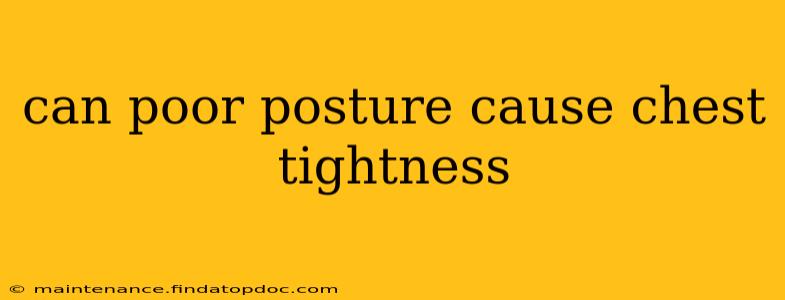Yes, poor posture can absolutely contribute to chest tightness. While chest tightness can stem from various medical conditions, including heart problems or respiratory issues, poor posture is a surprisingly common and often overlooked cause. Understanding the connection between posture and chest tightness is crucial for addressing this uncomfortable and potentially debilitating symptom.
How Does Poor Posture Lead to Chest Tightness?
Poor posture, particularly slouching or hunching, restricts the movement and expansion of your rib cage. This restriction impacts your respiratory system, leading to several consequences:
- Reduced Lung Capacity: When your chest is constantly compressed, your lungs don't have the space they need to fully inflate. This reduced lung capacity can lead to shallow breathing, making you feel short of breath and causing chest tightness.
- Muscle Imbalances: Slouching weakens the muscles in your back and chest, while simultaneously tightening the muscles in your shoulders, neck, and upper back. This imbalance puts pressure on your chest, restricting its ability to expand naturally and contributing to tightness. Tight pectoral muscles (chest muscles) are a major culprit.
- Nerve Compression: Poor posture can compress nerves in your neck and upper back, which can refer pain and tightness to your chest. This is a common cause of upper body pain, often mistaken for other conditions.
- Increased Stress: Prolonged poor posture often accompanies stressful situations, and stress itself can exacerbate chest tightness. The cyclical nature of stress and poor posture worsens the condition.
What Types of Poor Posture Contribute to Chest Tightness?
Several postural issues can cause chest tightness:
- Forward Head Posture: This involves jutting your head forward, placing strain on your neck and upper back, indirectly impacting chest mobility and breathing.
- Rounded Shoulders: This posture reduces chest expansion and compresses the lungs, leading to restricted breathing and chest tightness.
- Kyphosis (Curvature of the Spine): An exaggerated curvature of the upper spine can severely restrict chest movement, resulting in chronic chest tightness.
What Other Symptoms Might Accompany Chest Tightness Due to Poor Posture?
Besides chest tightness, poor posture can also manifest in other symptoms, including:
- Neck Pain and Stiffness: The strain on the neck muscles from forward head posture often results in pain and limited range of motion.
- Shoulder Pain and Stiffness: Similarly, rounded shoulders lead to shoulder pain and decreased mobility.
- Back Pain: Poor posture can strain your back muscles, causing aches and pains.
- Headaches: Tension headaches are frequently associated with poor posture due to the strain on the neck and upper back.
- Fatigue: The body uses more energy to compensate for poor posture, leading to overall fatigue.
How Can I Improve My Posture to Relieve Chest Tightness?
Improving posture is crucial for relieving chest tightness. Here's how:
- Become Aware of Your Posture: Pay attention to your posture throughout the day. Use mirrors and photos to assess your posture.
- Strengthen Core Muscles: Strong core muscles provide support for your spine and help maintain proper posture. Engage in exercises that strengthen your abdomen and back.
- Stretch Tight Muscles: Regularly stretch your chest, neck, and shoulder muscles to relieve tension and improve flexibility.
- Strengthen Back Muscles: Strengthen your back muscles to counteract the effects of tight chest muscles.
- Maintain Good Ergonomics: Ensure your workspace is ergonomically designed to support good posture. Use chairs with proper lumbar support, position your computer screen at eye level, and take frequent breaks to stretch.
- Practice Mindfulness and Posture Correction Exercises: Yoga, Pilates, and other mindfulness practices can help improve body awareness and postural habits.
When Should I See a Doctor About Chest Tightness?
While poor posture can contribute to chest tightness, it's vital to rule out serious medical conditions. Seek immediate medical attention if your chest tightness is accompanied by:
- Shortness of breath: Severe difficulty breathing needs immediate medical attention.
- Dizziness or lightheadedness: These symptoms may indicate a serious underlying issue.
- Pain radiating to the arm, jaw, or neck: This can be a sign of a heart attack.
- Rapid or irregular heartbeat: Unusual heart rhythms need prompt medical evaluation.
Chest tightness should not be taken lightly. While poor posture is a frequent contributor, it’s crucial to differentiate between postural issues and more serious medical conditions. Always consult a doctor to determine the underlying cause of your chest tightness and receive appropriate treatment.
